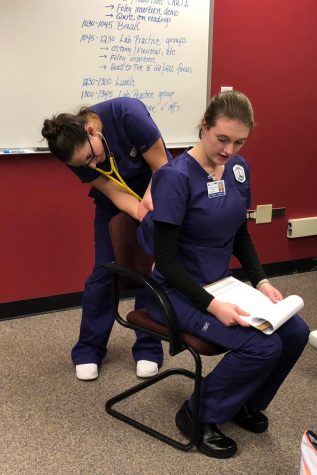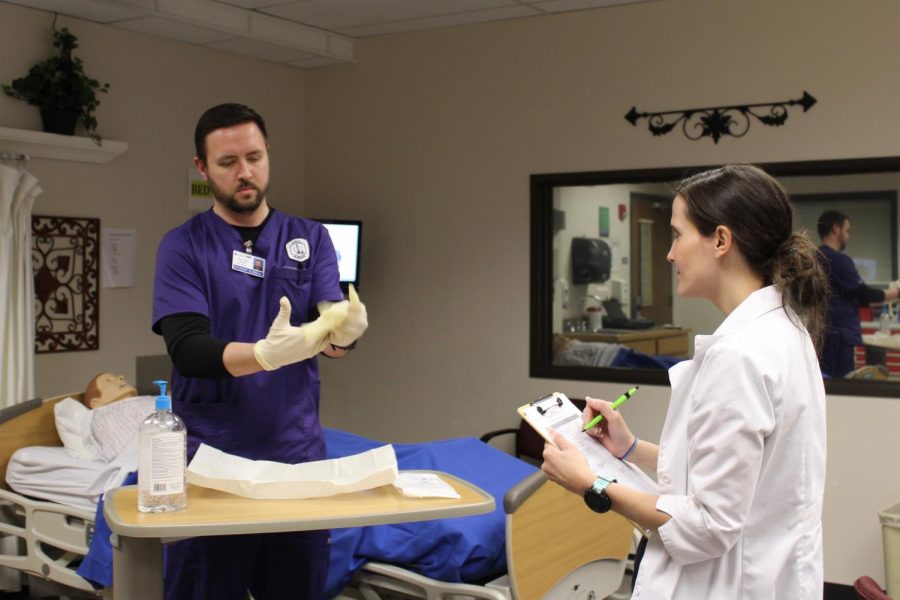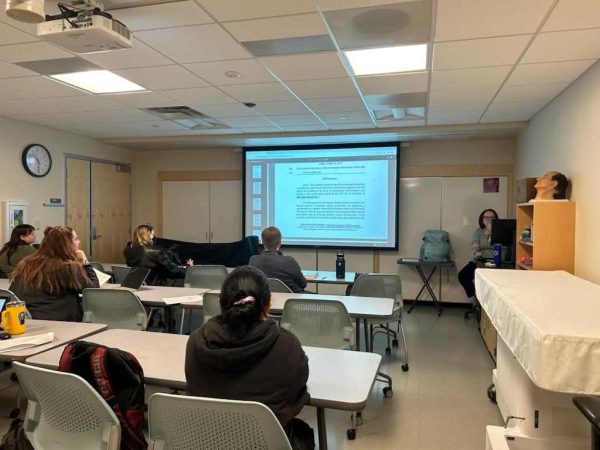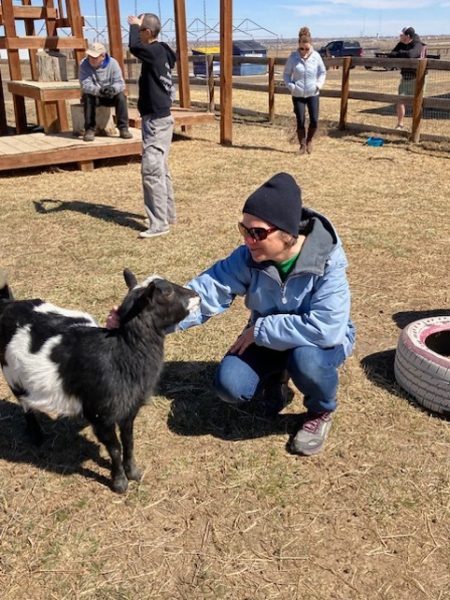ACC Could Offer Bachelor’s Degrees in Nursing if Bill Passes
Image via Rachel Lorenz
ACC nursing student Ross Fraser demonstrates how to correctly apply sterile gloves as instructor Stephanie Armstrong observes on Feb. 10, 2018, in Littleton, Colo. ACC and other community colleges could offer bachelor’s degrees in nursing if House Bill 1086 becomes law.
A proposed law aimed at reducing Colorado’s nurse shortage by allowing community colleges to offer bachelor’s degrees in nursing is making its way through Colorado’s General Assembly. House Bill 1086, which has bipartisan support, was passed by the House after its third reading on Feb. 12.
Both associate degrees and bachelor’s degrees in nursing prepare students to become registered nurses. At a growing number of hospitals, however, a bachelor’s degree is required for entry-level nursing positions, according to NursingLicensure.org.
Yet 56 percent of Colorado Community College System nursing graduates do not go on to pursue a bachelor’s degree in nursing. If HB 1086 becomes law, community colleges, not just four-year state and private institutions would be able to offer this degree.
“The community colleges have every capability of stepping forward to fill the deficit that we have in the state for qualified nurses, and we stand ready to fill that gap,” said Dr. Diana Doyle, president of Arapahoe Community College.
According to NurseJournal.org, ACC’s associate degree in nursing program is ranked in the top 11 percent of best nursing schools in the western region. The college would build a bachelor’s program on the foundation of its current associate program, says Dr. Hope Szypulski, director of nursing at ACC.
Although additional faculty would need to be hired and curriculum developed, physical space would not be a problem. “We already have the appropriate facilities,” Doyle said. ACC has the capacity to offer classes in the evening and even on multiple campuses, if necessary.

Natalie Maik and Kathleen Ruonavar, students in ACC’s associate degree in nursing program, practice a head-to-assessment on Feb. 7, 2018, in Littleton, Colo.
“The reason why we’re doing this is because there’s such a nursing shortage. We just want to service our community. There’s such a need,” Szypulski said.
With the state’s population rising and nurses of the baby-boom generation retiring, a sustained shortage of nurses is forecasted for Colorado. According to data from the U.S. Department of Labor, the demand for registered nurses was predicted to outstrip supply by about 490 nurses per year, starting in 2014. If changes aren’t made, the result could be a cumulative shortage of 4,500 nurses by 2024.
Proponents of HB 1086 see the law as opening up a less expensive pathway to a bachelor’s degree in nursing. Students who attend nursing programs in their community can stay where they currently live rather than relocate to a four-year institution. “There’s a lot of savings just in their personal everyday life–of where they live and how they get to and from their institutions,” Doyle said. In addition, tuition costs would be lower. According to Doyle, a bachelor’s in nursing would cost approximately $100 per credit hour less at ACC than it would at a four-year public institution.
Several ACC nursing students have been involved in the push to get HB 1086 passed. Joshua Mickelson, Sarah White and Kelsie Guthrie are featured in a video intended to raise awareness of the nurse shortage. Jason Lalonde testified in support of the bill at the House Health, Insurance, & Environment Committee hearing on Feb. 1.
https://www.youtube.com/watch?time_continue=8&v=_FO6sZafdTI
The House passed HB 1086 with 55 representatives in favor and eight opposed to the measure. The bill was then introduced in the Senate and assigned to the Health & Human Services Committee for consideration.














